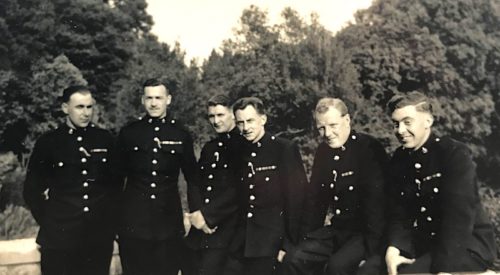
Eric on left as a new policeman
The term constable came from the governor of a royal castle, which in turn comes from the Latin ‘comes stabuli’ in the eastern part of the late Roman empire, meaning ‘Count of the stable’. The is he who was responsible for the security of the castle and later a local officer responsible for keeping the peace and suppressing riots, prior to the establishment of the modern police force – it now refers to a policeman or woman of the lowest rank.
You all know that the first London (Metropolitan) Police was founded by Sir Robert Peel in 1829 and were known as ‘Bobbies’ or ‘Peelers’. Prior to this, there was The Watch, who walked the streets at night carrying lanterns, armed with swords and calling out the hour.
With the coming of the Municipal Corporations Act 1835, the large cities and boroughs were caused to organise efficient modern police forces. Watch committees were set up to establish these local forces. In Kent, where I served as a Police Officer, they had the Cities of Rochester and Canterbury, boroughs of Gravesend, Chatham, Dover, Folkestone, Ramsgate, Margate, Maidstone and the Royal Borough of Tunbridge Wells.
So the ‘modern’ police forces were started. I say ‘modern’. In 1856 the County and Borough Police Act was passed that forced County Councils of 24 counties who did not have a police force to make arrangements to appoint a Chief Constable. So, in January 1857 the Kent County Police was formed but only covered the remainder of the county, excluding the cities and boroughs that were already policed.
The first Chief Constable (CC) was Captain Ruxton who had served as an ensign in Kings Inn Regiment of Infantry in India and Australia. He was appointed with the salary of £400 per annum. He served until 1894 and retired at the age of 77 years. He had outlived all of the 222 men of the original force.
The Kent Police was to remain in this form until 1947, when all the Kent Police Forces – counties, cities and boroughs – were amalgamated – with divisions in different areas based on certain police stations.
When I joined in April 1950, there was still antipathy between the ‘countymen’ and the ‘boroughmen’, which has long since died. As all are now ‘men of Kent’ or Kentish men’.
I was fifty years old when I retired in 1975 after 25 years in the force serving in Faversham and West Malling.

A few years before retiring as Station Officer at West Malling Police Station
